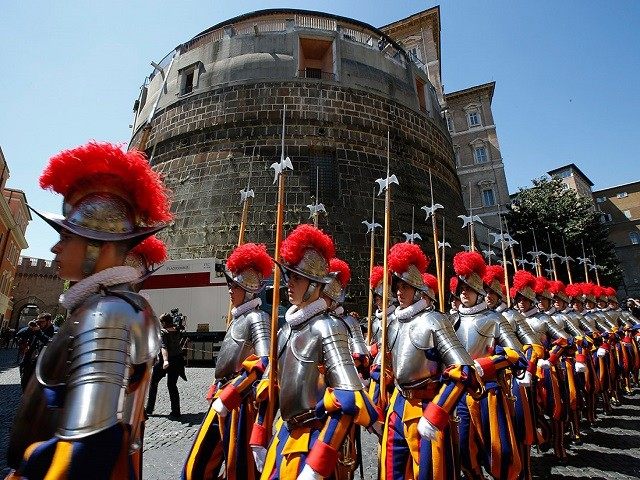ROME, Italy– “What happened in Paris with the Charlie Hebdo attacks could also happen at the Vatican. We are ready to intervene to ensure Francis is protected,” says the new commander of the Swiss Guard, Colonel Christoph Graf.
Throughout Rome, security has visibly increased in the wake of recent ISIS threats and the proximity of Islamic State militants in Libya. A special security taskforce has been convoked to plan Rome’s response to escalating ISIS threats, including special protection for “sensitive targets.”
The Italian Minister of the Interior Angelino Alfano met with Vatican officials this week to discuss Vatican security, which Alfano described as “very high.”
The 54-year-old Graf, who enlisted in the pontifical Swiss Guard in 1987, was appointed commander of the Guard on February 7, 2015, making him the 35th to serve in this role. The colorful Swiss Guard is an elite military unit that traces its foundation back to 1506, when the first battalion of 150 soldiers arrived upon the request of Pope Julius II.
Graf said that, due to recent ISIS threats against the Pope and the Vatican, the Swiss Guards are more focused than ever. “We have asked the guards to be more attentive and carefully observe people’s movements,” he said. “What happened in Paris can happen here in the Vatican, and you cannot preempt this without an intelligence service that has precise information.”
Graf said that his troops “are always ready to intervene.”
Candidates for the Pontifical Swiss Guard must be Catholic, single, Swiss males who have completed basic training with the Swiss military, between 19 and 30 years of age, and at least 174 cm (5 ft. 8.5 in.) tall. Many enlist out of a sense of faith and loyalty to the Church, as well as family tradition in many cases. The new commander, for instance, has said that he sees his role as a vocation. “For a Catholic,” he said, “being able to protect the Pope is the greatest thing you can do.”
Francis’ outgoing style and insistence on being close to the people causes its own problems for security. Though Graf says he believes “that the Pope is not afraid of anything,” other people are afraid for him, and accountable as well.
“For us,” said Graf, “there is the difficult task of ensuring his safety, but I also believe that you get used to it with time.” People often ask me “whether it is a nightmare for us,” Graf said. “I tell them it’s not, you just need to get used to it.”
The Pope has asked for space, Graf says, since he doesn’t like security too close to him. “We try to respect this request,” says Graf, “even the Pope needs freedom.” He said that they give him some space “but observe his movements, ever ready to intervene.”
On Wednesday evening, the Minister of the Interior Angelino Alfano brought together the national committee for order and public safety, along with the deputy minister, Philip Bubbico, and the Chief of Staff of Defense, Binelli Capes. The committee has prepared the strategic plan for use of a contingent of 4,800 soldiers for safeguarding sensitive targets, in addition to the regular police force.
The “sensitive targets” to receive extra protection include places of worship, such as Saint Peter’s Basilica and Rome’s Jewish Synagogue, embassies and consulates, strategic infrastructure such as power plants, as well as public transportation such as airports, train, and subway stations. For the moment, this state of special alert will extend until June 30.
Follow Thomas D. Williams on Twitter @tdwilliamsrome.

COMMENTS
Please let us know if you're having issues with commenting.